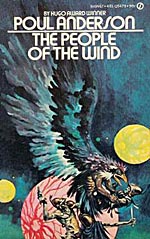
![]() couchtomoon
couchtomoon
6/3/2014
![]()
May was a month of second and third chances, when I read popular SF authors that have somehow captivated the fandom, but have not captivated me. In these cases, it's simply a matter of preference: I'm not macho enough, girly enough, or childish enough. In the case of Poul Anderson, I'm simply not impressed enough. Maybe I haven't chosen the right Anderson books.
Much like the epic song this book triggered in my mind (a peculiar combination of Billy Thorpe's 1979 space rock anthem "Children of the Sun" and Rage Against the Machine's 1996 Chiapas rant "People of the Sun"– not a bad combo, I must say), People of the Wind promises a complex and sprawling political scheme with alien overtones, akin to C. J. Cherryh's Foreigner series (a much later 90's series, so an unfair comparison, I know). However, the book itself can't possibly deliver much within its paltry 200 pages packed with oddly constructed prose and a dozen multi-named characters to keep track of. It's an eye-tripper, instead of a mind-tripper.
The planet Avalon is shared by two very different groups: human descendants of Earth and settlers of a sapient bird-like race of Ythrians. The two races share tense but peaceful diplomatic ties, with respect and emulation brewing among the younger generations. Unfortunately, hostilities between their home planets of Earth and Ythria result in imperialistic aggressions toward the colonial planets. Now the Avalonians must overcome their differences in order to defy their more powerful parental planets. And the planet of Avalon—nature itself—may resort to a few of its own defensive tricks.
The plot truly feels Cherryh-esque, but what Cherryh constructs into 400-plus pages (and an entire series that I never pursued), Anderson parcels out into a slim outline of conflict, tidbits of bomb blasts and diplomacy, interpersonal strife that occurs between stenciled characters who represent a variety of simplistic worldviews. It reminds me of Asimov's skeletal Foundation series— epic ideas, but sparse storytelling. A novel stunted by the weight of its own ideas, written by an author who seems uninterested in building the appropriate structure to support it. Anderson's The High Crusade (1960) suffers from the same barrenness, but I excused the issue by categorizing it as a children's book. Maybe this is just Anderson's style.
Part of this sparseness is evidenced in the prose, which makes me wonder if Anderson's Swedish heritage imbues language and storytelling with the same minimalism that influences modern Swedish furniture design. I like slim leather sofas, but I love bulging multi-themed stories. And while the prose of People of the Wind is sparse, it contains some oddly constructed sentences. Anderson spent most of his lifetime in the United States, but some of his phraseology feels clunky, as if lost in translation:
"Utterly irrelevant passed through his head the memory of an instructor's lecture" (p. 85).
"Rays had smitten" (p. 94).
"His gaze clanged on Rochefort's" (p. 158).
"Her eyes went to him, her hand to a table beside her whereon lay a knife" (p. 165).
"'What I am learning, Eyath, my sister, is that she is not you and you are not her, and it is good that you both are what you are'" (p. 217). (This dude has a crush on his bird-sister.)
WTF?
I live in a bilingual home. I hear weird things in English all the time, and I say weird things in Spanish all the time. But this is a published novel. Sometimes, I think editors are as mythical as space whales.
Minimalism is death to a space opera. Complexities are left unexplored; characters are left gasping for the breath of life. In one particularly heated conflict after an incident of bird-rape, two characters threaten death by duel, but agree to postpone the event until after the war. Anticlimax alert! One opponent dies in the war, and the duel never happens and is never mentioned again, sacrificing a treasure trove of human stressors in the midst of a dying war. An opportunity lost to the next chapter of something completely different.
As an early seventies novel about conflicting ideologies cooperating for the sake of peace and survival, People of the Wind is a hopeful, experimental metaphor for the ideological conflicts that pervaded the mid-20th century. Some might interpret it as an allegory for racial and ethnic cooperation in a world still seething after the previous decades of civil rights achievements, likening the tense relations between humans and Ythrians to that of the so-called "melting pot." On a more specific scale, the Israel-Palestine conflict comes to mind often, where the occupation of territory between two disagreeing peoples results in instability and weakness that practically blinds the combatants to the danger of outside interests. Perhaps Anderson is warning both nations that their differences are superficial compared to the threat of imperialistic hegemony from each side's supposed allies.
"'The biracial culture they're creating. Or that's creating itself; you can't plan or direct a new current in history. I wonder if that wasn't the source of their resistance—like an alloy or a two-phase material, many times stronger than either part that went into it. We've a galaxy, a cosmos to fill—' My what a mixed bag of metaphors, including this one, gibed his mind" (p. 219).
Mixed bag, it is. Even with his demonstrated self-awareness, this loaded metaphor drifts in the vacuum with all the other potentially interesting components. And by the final chapter, when the flora and fauna of Avalon fight back imperialism in the forms of mutant cockroaches and allergic reactions—well, let's just say Anderson had a lot to say, but not enough commitment to say it.
It could have been so much more! I loved the ideas in this book, but the story just didn't deliver. But, in accordance with this month's theme, many people loved it much more than I did. It even inspired a board game!
Goodbye, May and good riddance! Thursday's review will be much more positive!
http://couchtomoon.wordpress.com